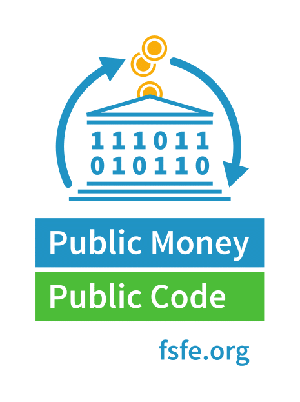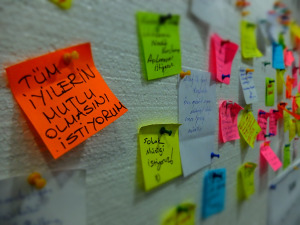|
Size: 13029
Comment:
|
← Revision 104 as of 2017-09-26 11:53:04 ⇥
Size: 14995
Comment: Add press coverage
|
| Deletions are marked like this. | Additions are marked like this. |
| Line 34: | Line 34: |
| Line 48: | Line 47: |
| * another point of interest is to demand for data that is not focusing on one or more specific projects, but rather on the use and release of Free Software by public administrations, in a more inclusive sense. For instance, submitting questions about the percentage of software developed by public authorities that is being released under Free Software licences. | * another point of interest is to demand for data that is not focusing on one or more specific projects, but rather on the use and release of Free Software by public administrations, in a more inclusive sense. For instance, submitting questions about the percentage of software developed by public authorities that is being released under Free Software licences. |
| Line 50: | Line 49: |
| = Public Money Public Code in the press = * Spiegel Online (German): [[http://www.spiegel.de/netzwelt/netzpolitik/public-code-aktivisten-fordern-freie-software-vom-staat-a-1167416.html|Public Code: Aktivisten fordern Transparenz bei staatlicher Software]] * Süddeutsche Zeitung (German): [[http://www.sueddeutsche.de/digital/it-sicherheit-wahl-software-soll-sicherer-werden-aber-das-dauert-noch-1.3667941|Wahl-Software soll sicherer werden - aber das dauert noch]] * heise online (German): [[https://www.heise.de/newsticker/meldung/Kampagne-Public-Code-Software-fuer-die-Verwaltung-soll-frei-sein-3830705.html|Kampagne Public Code: Software für die Verwaltung soll frei sein]] * golem.de (German): [[https://www.golem.de/news/public-money-public-code-31-organisationen-fordern-freie-software-in-der-verwaltung-1709-130034.html|Public Money Public Code: 31 Organisationen fordern freie Software in der Verwaltung]] * Boing Boing (English): [[https://boingboing.net/2017/09/14/snowden-public-money-shouldn.html|Snowden: Public money shouldn't fund software the public isn't allowed to fix]] * El Economista (Spanish): [[http://www.eleconomista.es/tecnologia/noticias/8605372/09/17/31-colectivos-reclaman-una-legislacion-que-obligue-a-las-instituciones-publicas-a-utilizar-software-de-codigo-abierto.html|31 colectivos reclaman una legislación que obligue a las instituciones públicas a utilizar 'software' de código abierto]] * SAPO (Portuguese): [[http://tek.sapo.pt/noticias/computadores/artigos/associacoes-exigem-que-governos-usem-software-livre-e-de-codigo-aberto|Associações exigem que Governos usem software livre e de código aberto]] * Numerama (French): [[http://www.numerama.com/politique/289690-une-campagne-appelle-a-rendre-public-le-code-source-des-logiciels-finances-par-le-contribuable.html|Une campagne veut rendre public le code source des logiciels financés par le contribuable]] Find more press coverage [[/Press|here.]] |
Contents
Join the action!
This wiki page is part of the FSFE campaign Public Money Public Code and a call for action!
What is it all about?
We ask all the public authorities in Europe that develop software inhouse or that pay external software development and finance or co-finance the development with public funds, to release the software under a Free Software licence that guarantees the four essential freedoms: to use, study, share and improve the code. 
Why does it matter?
All public bodies should treat public funds carefully, ensuring the best possible value-for-money is obtained whenever public money is being spent or invested.
Public authorities often spent public funds for software development or sometimes even have in-house developers, whose salaries get paid with public money. Given the public nature of the funds and the public nature of the authorities, the software should be treated as a public good as well. Publishing the publicly financed software under a Free Software license should be the norm.
Furthermore, public authorities can profit in multiple ways from using a Free Software license for their own developed software. Among the benefits are the possibility to reuse a developed software among different administrations, the independence from vendors and vendor-lock-ins, gaining control over their own IT infrastructure and benefits from sharing knowledge as well as the possibility to check the code about its security.
Free Software and its four freedoms to use, study, share and improve the software, turn the software into a public good with direct benefits for our society and its citizens. In addition, it enables co-operation among public authorities between regions and states.
About the campaign: Public Money Public Code
The FSFE is preparing a campaign that demands from European governments to make sure that whenever public authorities develop software in-house or order external software development and finance or co-finance it with public funds, to release the software under a Free Software licence.
The campaign will be rolled out in three stages:
- We collect information about the use and misuse of public money regarding software development.
- We use this information for analysis and publications to highlight the importance about publicly financed software to be published as Free Software.
- We try to make momentum for our message and our data via web, prints and social media.
What can I do?

In the first step, we like to collect information about the status of non-free software used and released by public authorities in local, state and European level. We will do this via #Freedom of Information requests on local, regional and national level and this is where we need your help!
If you are an individual, an organisation or a community, please help us by submitting #Freedom of Information requests to public authorities of your municipality, region, or state and send us the answers. The #collected data will be aggregated and scrutinised to draw conclusions on how and if, at the end of the day, public money results to public code.
One idea is to find "interesting cases" all over Europe and later request specific data about them. With "interesting cases" we look for example for
- Non-free software that is being used across different states/municipalities but every time another state or municipality wishes to use it, they have to re-purchase the same licences;
- although a software is being developed by a public body, other interested cities/states cannot re-use it, because it is not released under Free Software licences;
- also interesting are good examples: software that is developed by a public body and is indeed released as Free Software;
- another point of interest is to demand for data that is not focusing on one or more specific projects, but rather on the use and release of Free Software by public administrations, in a more inclusive sense. For instance, submitting questions about the percentage of software developed by public authorities that is being released under Free Software licences.
Public Money Public Code in the press
Spiegel Online (German): Public Code: Aktivisten fordern Transparenz bei staatlicher Software
Süddeutsche Zeitung (German): Wahl-Software soll sicherer werden - aber das dauert noch
heise online (German): Kampagne Public Code: Software für die Verwaltung soll frei sein
golem.de (German): Public Money Public Code: 31 Organisationen fordern freie Software in der Verwaltung
Boing Boing (English): Snowden: Public money shouldn't fund software the public isn't allowed to fix
El Economista (Spanish): 31 colectivos reclaman una legislación que obligue a las instituciones públicas a utilizar 'software' de código abierto
SAPO (Portuguese): Associações exigem que Governos usem software livre e de código aberto
Numerama (French): Une campagne veut rendre public le code source des logiciels financés par le contribuable
Find more press coverage here.
What is a Freedom of Information request?

Freedom of information laws allow citizens to access public data, held by national governments and public authorities. In order to access this data, citizens have to submit official requests to competent authorities, the so-called Freedom of Information (FOI) requests, either at no cost or for a small fee.
The freedom of information legislation was triggered by the persistent obstacles citizens had to overcome in order to access critical public information, in combination with a degree of secrecy and obscurity surrounding government policies and decision making. Many EU member states have developed their own Freedom of Information legislation, in most cases harmonizing their national law with the EU legal requirements. For that purpose, they have established specific procedures that ensure access to public information, and a bigger level of transparency in the public sector. In many countries, there are organisations which aim to improve the information access process and support individuals and other organisations who wish to submit FOI requests for issues of great societal significance. A few of them even run online platforms, where information requests may be submitted addressing the public authorities. Look at our #Country information sector to hopefully find a platform in your country that facilitates your Freedom of Information requests.
Freedom of Information Request Samples
Here you can find samples for Freedom of Information (FOI) requests and requests in front of state parliaments. Feel free to use the sample text as it is, adapt it to the specific needs of your state/region or compose from scratch your own requests, as long as their core can still be used in support of our argumentation.
Draft for a Standard Request for PMPC for local Administrations
Draft for a Standard Request for PMPC for a specific IT-Project
Draft for a Standard Request for PMPC: Parliamentary Requests
Get inspiration by example: The FSFE's FOI request for Horizon 2020
How to file a FOI request?
In general you ask for existing documents. EU citizens and residents have the right, protected by law, to ask all EU institutions for documents and to receive answers within 15 working days. You can, for example, ask any institutions on EU level about minutes of lobby meetings with software companies or emails concerning these meetings.
Procedures may slightly differ among states and public institutions. In general, they are legally obliged to answer your request in a certain period of time. Depending on the complexity of your request the answering period may be extended. In general, there are exceptions what kind of documents citizen can request. There are exceptions if administration claim that privacy issues or national security or competition rights are affected. Still, you can ask in such cases for the document with blacked out passages. Your FOI request can be denied if for example the institution can argue that collecting the requested information would be too costly. Still, in such cases you can narrow down your request until it is accepted. If you disagree with an answer, most countries have institutions where you can file a complaint. On EU level, this is the EU Ombudsman.
You can either do a request by mail or email directly at government institutions, or you can use a platform for requests. There are many NGO funded platforms that allow citizen to publish answers they got publicly. Also, most of them help you with information on the legal situation in your country regarding FOI requests. We listed some of the platforms we know down below. We did not test all, so please make your own decision if you want to send your request over a platform or directly.
How to add the info of the requests?
 To facilitate the collection process, please add your data sorted by "Country", under the section "Add your FOI requests here", usually found at the bottom of the country sub-page. You can find a list with all the country sub-pages below. If a sub-page does not exist yet, we kindly invite you to create it and add your data there. In any case, please let us know about your FOI requests and outcomes at: contact@fsfe.org with the subject line "FOI for PMPC" . We will make sure that they receive the necessary attention.
To facilitate the collection process, please add your data sorted by "Country", under the section "Add your FOI requests here", usually found at the bottom of the country sub-page. You can find a list with all the country sub-pages below. If a sub-page does not exist yet, we kindly invite you to create it and add your data there. In any case, please let us know about your FOI requests and outcomes at: contact@fsfe.org with the subject line "FOI for PMPC" . We will make sure that they receive the necessary attention.
If you make a FOI request, remember to document it fully and include the following very important information:
- Date of the request
- Specific region/city (if applicable)
- Who made the request?(eg. FSFE, MP, political party, citizen, etc.)
- Agency/Party/Specific person who received the request (eg. political party, parliament, public authority, politician, MP, etc.)
- Official title or short title of the request
- Subject of the request
- Short description of the requested data
- the background of the request (eg. National Elections) and the reason why this action was considered necessary, Outcome of the request, Relevant link(s).
The attachment of documents to this wiki is possible, and these attachments can be versioned. For more information on how to use the wiki as a document repository, please consult this toolkit.
Country Information Pages
European Union: It is possible to contact all the European Union Agencies, asking for information, here.
Germany: you can submit your FOI requests online via FragDenStaat.de.
Netherlands: you can submit your FOI requests directly to government agency (WOB: Wet Openbaarheid van Bestuur).
United Kingdom: you can file your FOI requests online via whatdotheyknow.com.
Related wiki-pages
